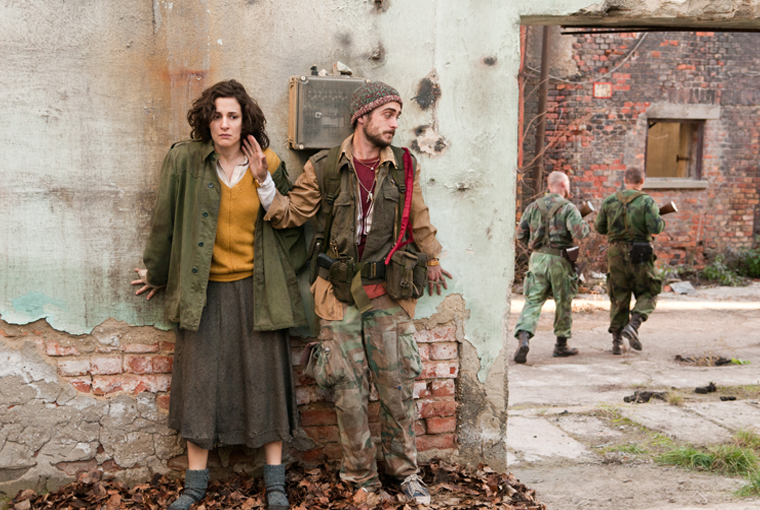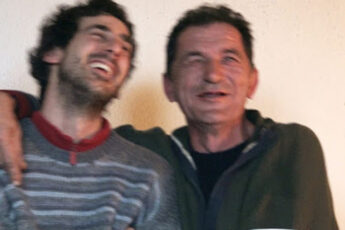International Style
Angelina Jolie’s In the Land of Blood and Honey (2011)
Vol. 15 (March 2012) by Moritz Pfeifer
Shortly before the outset of the Balkan war, Ajla and Danijel fall in love. Ajila is Bosnian and Danijel a Serb, a fact that complicates the future of their relationship. But a couple of months later they have the chance to meet again. Danijel now works as the commander of a Serbian unit and Ajila is trucked to his camp as a prisoner – a blessing in disguise. In a Schindleresque vain, Danijel decides to protect Ajila from torture and rape. Not before long, they fall in love again. But Danijel’s good intentions are not firm enough to defy his father’s hatred against all Bosnians. The brutal warlord brainwashes his son, and public opinion effaces remaining doubts. In the meantime, thousands of people die horrible deaths.
Whether such a love-story was likely or not, it is not implausible to assume that the Balkan wars separated families, friends, neighbors and surely also lovers, pushing them to intrigue against one another as communities were redefined by racial and religious categories. Jolie’s model-like conflict may emotionally reflect the experience of many people affected by the war. There is nothing to put up against the story, except perhaps that it could have told us that war is bad in less than two hours. But Jolie’s film seems false. Why?
Croatian writer Slavenka Drakulić seems to have found an answer to this question:
The other thing an author dealing with war is likely to encounter is that people who have experienced war are usually very distrustful of and sensitive to “outsiders”. They believe that, because of their experience, they have sole ownership over it and that they alone have the moral right to tell the world about it. Never mind that they are perhaps unable to express themselves or do not know how to do it. Others, coming from the outside – whether from Hollywood or from Zagreb – are considered intruders who simply cannot understand and may even have suspicious intentions.1
Drakulić gives reason to the witness as the only acceptable historical account, explaining Serbians’ or Bosnians’ supposed difficulties with Jolie’s film by the fact that she is an “outsider.” Angelina Jolie was born and raised in America. She doesn’t speak Serbian, and she began her career as an actress when the wars started. So this is obviously true. But can you tell from seeing the film? What makes a genuine “Serbian” or “Bosnian” film different from an American film about these countries?
I don’t know whether Drakulić has seen any of these “genuine” films – if she has, then she must have noticed that there is little difference between Jolie’s film and recent Serbian or Bosnian films about the war. Take Cirkus Columbia (Bosnia, 2010) as an example – a film about a couple falling in love right before the war. The film not only deals with a similar theme, but is also aesthetically indistinguishable from Jolie’s sharp-but-creamy-looking cinematography. The same goes for Ordinary People, a Serbian film from 2009 about an undefined massacre. It is impossible to consider these films as distinctly Bosnian/Serbian because they avoid to convey any particular point of view. Indeed, they are as American as Jolie is Serbian. In the Land of Blood and Honey meets Ordinary People in a strange no-man’s-land, where it is impossible to tell who imitated whom.
Different times ask for different forms of expression. In contrast to the bloody, dark-humored Balkan war-films of the nineties that were so full of a distinct and recognizable style that they literally exploded, today’s war-films are look-alikes. One might use the term “international style” to describe these films. Films in international style are like the ready-made housing facilities with the same looks – politically correct, but frightening considered that the plan was to construct entire cities in that style. For filmmakers that think that somewhere someone actually lives in cozy regularity, the “international style” is – like its architectural predecessor – comfortable enough not to feel underprivileged. But films in international style loose meaning because they lack someone to make a claim. Ready-mades are prefabricated. They don’t need life to come alive.
One prefabricated tool that comes from these films and that is a major problem in Jolie’s film is the idea that whatever microcosmic world one portrays, it will – qua art – always be general enough to appeal to the identificatory mind. But generalizing the lives of particulars does not make stories universal, in the same way that using the aesthetics of blockbusters can hardly define the grandeur of a film.
It seems useless to restrain the word “insider” to someone who has witnessed an event. Witnesses can be as blind as outsiders. An outsider might even be able to see more than someone who was “there.” Things only get uncomfortable when both inside and outside witnesses are unable to give an account of what they saw. If Jolie’s film can show the Balkans their own (cinematographic) story, Balkan films can tell Jolie quite a lot about Hollywood. But it seems that each side is so much in the search of the other that they have come to share one and the same point of view – that of being out of focus.




Leave a Comment